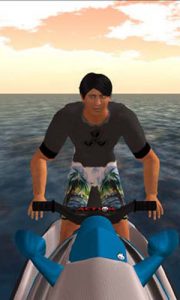
FORT LAUDERDALE-DAVIE, Florida – Some people use alternate virtual world programs like Second Life® to escape reality, but one researcher is examining whether these same virtual worlds that are used to stimulate the imagination could help amputees develop the skills needed to navigate the real world.
Sandra Winkler, who has a Ph.D. in occupational therapy and serves as a faculty researcher and assistant professor for the Nova Southeastern University College of Health Care Sciences, was recently awarded a three-year grant totaling nearly $1 million in funding from the U.S. Department of Health & Human Services Agency for Healthcare Research & Quality to pursue her study. The project costs will be 100% financed with federal funds.
Winkler’s research titled “Dissemination of Amputation and Prosthetic Evidence-based Medicine (DAP-EM)” will translate into educational and supportive programs for amputees to benefit amputees functionally and psychologically and potentially help reduce “phantom limb pain” which commonly occurs in amputees as a result of the trauma they experienced.
“Patients will be able to enter our virtual island and simulate what it is like to once again use their missing limbs,” said Winkler. “This has the possibility to make life better for so many amputees, and all they will need is an Internet connection.”

Participants in the study will be able to virtually experience everything from riding on a jet ski to diving in a coral reef. The virtual world will also include a historical tour of prosthetics, educational seminars, and a forum for participants to anonymously meet and discuss common issues and challenges they face in the real world. They will even be able to “test” different prosthetic models in a virtual shop, allowing them to gain a sense of different types of devices and determine what may be the best for them.
“It is our hope that this project will not only support the amputees, but support clinicians and caregivers by allowing them to simulate and learn more about life as an amputee,” said Winkler. “This research can eventually be translated to help individuals with other chronic conditions.”
Doctoral students from NSU will also be a part of the research, including working with military spouses in a virtual world environment and helping amputees plan home modifications using a virtual home.
There are currently approximately 2 million people living with limb loss in the United States, according to the National Limb Loss Information Center. This number is projected to increase to 3.6 million by 2050. Approximately 185,000 amputations occur in the United States each year. The expected lifetime costs of veterans with amputations ranges from $1.4 to $1.8 million, not including surgery or future technologies.
For more information about this study, please visit www.virtualhealthadventures.org.

